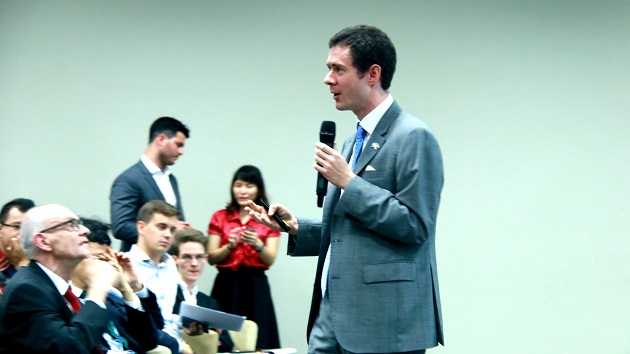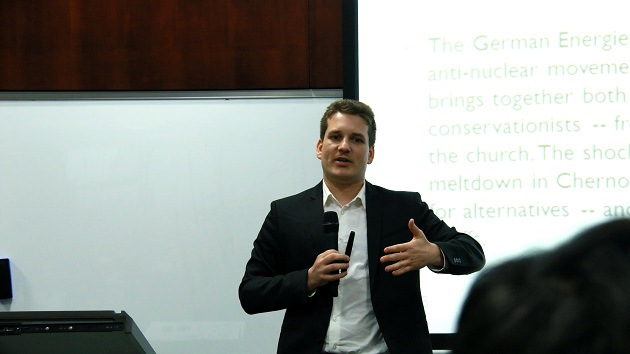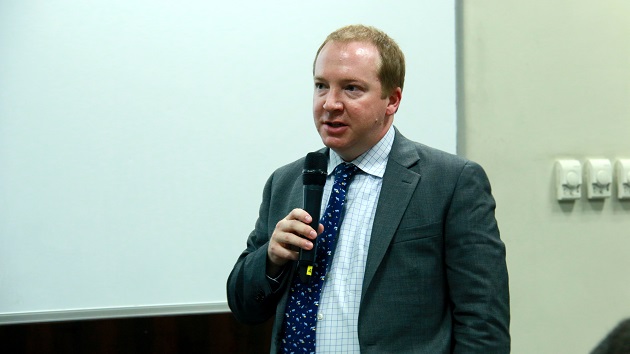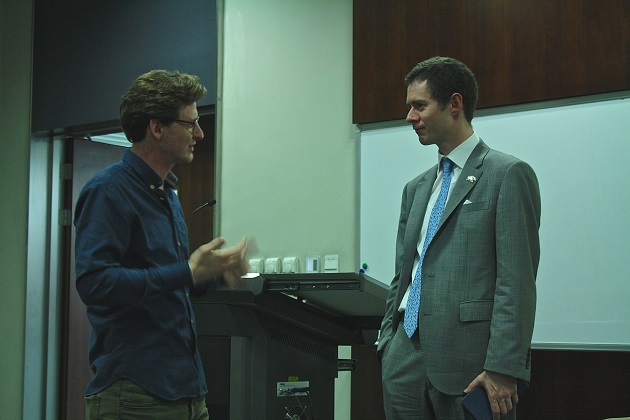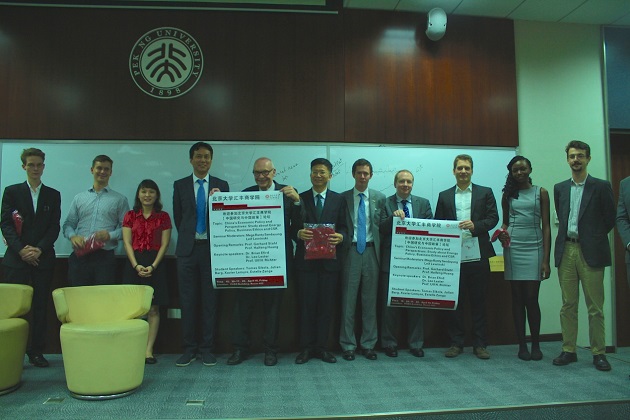As one of China’s most internationalized business schools, Peking University HSBC Business School (PHBS) provides students a body of lectures, seminars, and forums by inviting scholars and entrepreneurs to share their insights on some of the most pressing current economic and social issues.
The recent seminar China’s Economic Policy and Perspectives: Study about Energy Policy, Business Ethics and CSR is an indicator of such endeavors. The seminar was a joint offering between Prof. Huang Haifeng who leads the China Studies course and Gerhard Stahl who teaches institutional economics. Special guests included Prof. Ulf Henning Richter., assistant professor of strategy at University of Nottingham Ningbo China; Brian Efird, program director of Human Geography of Energy at KAPSARC located in Riyadh, Saudi Arabia; Leo Lester, North East Asia leading researcher for KAPSARC; and David Gui, secretary general of China International Forum on Green Development. KAPSARC, King Abdullah Petroleum Studies and Research Center, is as an independent, non-profit institution that focuses on research in energy economics, policy, technology, and the environment. The organization has a multi-national research team.
How to quantify human decision-making impacts
Leo Lester talks about KAPSARC’s human geography of energy program which quantifies human decision-making impacts
Leo Lester shared KAPSARC’s human geography of energy program, which aims to capture non-economic elements, like social, cultural and historical elements to assess people’s behaviors and driving force behind the policy-making process. As an example, he introduced a model to turn a qualitative evaluation into a quantitative one to numerically measure how powerful stakeholders are and the way they interact with each other. Lester thinks the model can provide more transparency over the prediction of stakeholders’ behaviors.
In terms of economic policies, Lester said this framework can be used to understand China’s collective decision-making process and the stakeholders involved. “We can quantify the abstract aspects to see how attitudes of our stakeholders differ and overlap. By turning those sentences into numbers, we can start to see patterns,” he commented. For example, researchers can use computer programs to look at how a negotiation and power landscape will work.
Energy Transition as A Global Sense-making Process
Prof. Richter spoke on the history of Germany’s “Energiewende” and its impact on China
Prof. Richter focused broadly on energy policy in his keynote speech The Dissemination of the Renewable Energy Industry of Germany to China. He first spoke on the history of Germany’s “Energiewende” (energy transition), and viewed it as a national commitment to meet aggressive economy-wide de-carbonization targets. Triggered by the shock of the oil crisis and the meltdown in Chernobyl (26 April, 1986), this movement strives to transform the German power sector from a reliance on nuclear energy and coal to renewable resources within the next four decades. Said Richter, “It has to be a major economy that is able to set an example about how to produce energy in a different way. And the transition is a global sense-making process.”
Richter said that Germany has restructured its energy consumption by reducing reliance on nuclear power and coal and boosting renewable energy. The German Environmental Ministry estimates that renewable energy offset 6.7 billion euros in energy imports in 2010 alone. He pointed out that even more important, the transition also created a mass market for renewable energy globally and especially gave a boost to the Chinese solar panel industry. “China actually plays a major role in Germany’s energy transition. Without China’s cheap production, we couldn’t have made it. On the other side, it also benefits China economically and environmentally,” Richter remarked.
Interactions between speakers and students
Brian Efird uses examples to explain how to precisely quantify stakeholders’ influence and attitudes
German student Max Kuchenbuch asks Leo Lester some questions about the model’s theoretical framework
After the lecture, students had the chance to ask further questions about how human decision-making impacts energy markets and policy formation, as well as discuss alarming issues around China’s energy policies and long-term prospects. In terms of how to precisely quantify stakeholders’ influence and attitudes, Efird used politicians as an example and maintained that “the measurable frequency of their acts and the related responses can be a good indicator of their true intentions.” Further, students Julian Barg and Tomas Sikola gave talks on business ethics and CSR in China, covering such issues as business transparency and Huawei’s growing devotion to CSR.
"It's always interesting to get some international perspective on issues in China such as environmental problems and policy making. Dr. Efird and Dr. Lester definitely gave interesting insights,” said Barg Julian, an international student from Germany. American student David Ko said, “Seminars such as this help students broaden their views on China and other countries that will have an impact upon businesses and governments not only in China but across the globe.” He said that he also appreciates that through the China Studies course students can be exposed to an array of international perspectives that transcend cultural barriers.
Seminar guests. From left: Julian Barg (student), Tomas Sikola (student), Mega Ranty (student), Huang Haifeng , Gerhard Stahl, David Gui, Leo Lester, Brian Efird, Ulf Henning Richter, Estelle Zanga (student), and Xavier Lemyre (student).
By Annie Jin
Edited by Priscilla Young





